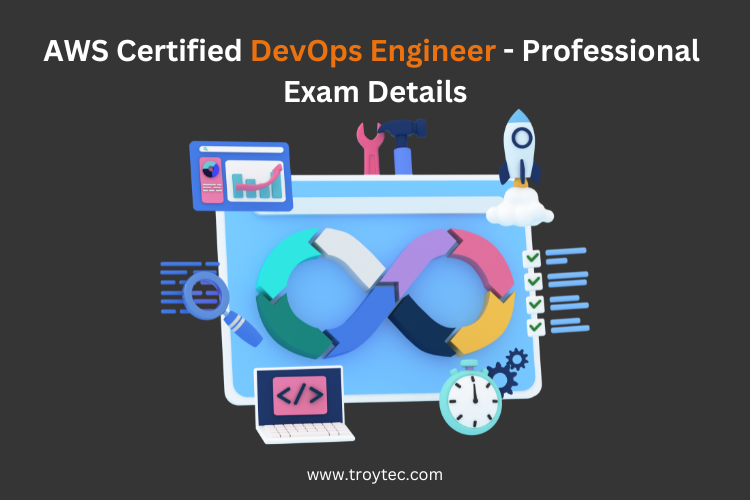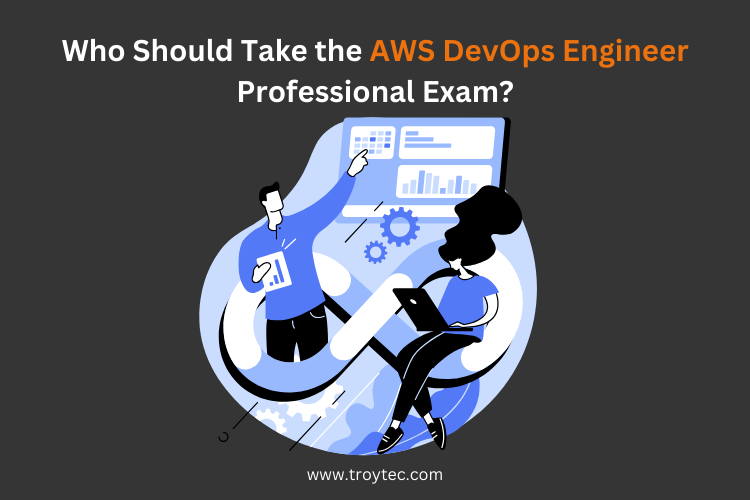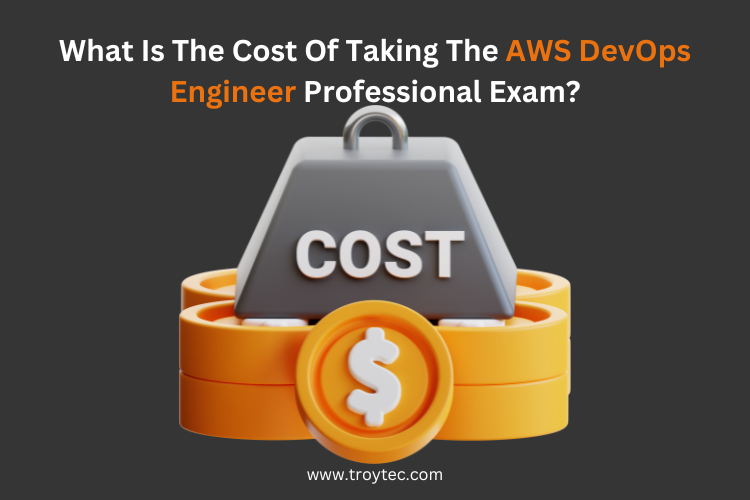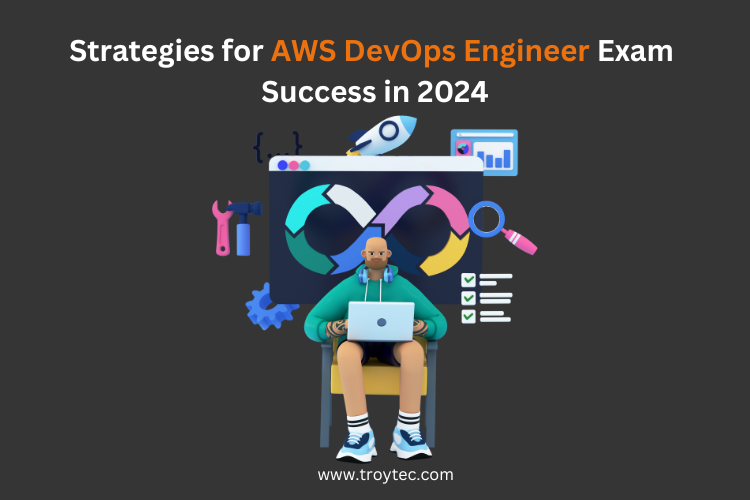One crucial accomplishment that demonstrates your ability to create, deploy, and oversee highly accessible, scalable, and responsibility-tolerant infrastructure in the AWS cloud is earning your AWS Certified DevOps Engineer – Professional Certification. Acquiring the practical skills required to succeed as an AWS DevOps Engineer goes beyond the certification, which certifies your technical abilities.
An AWS DevOps Engineer must possess unique technical and soft skills, including problem-solving, collaboration, and communication skills, as well as knowledge of programming dialects, AWS services, and DevOps principles. Additionally, AWS DevOps Engineers must ensure system security and compliance while implementing the newest methods for automation, perpetual growth, delivery, and deployment.
The computing and software development cycles have changed significantly during the past 20 years. As a result, the areas responsible for this fundamental transformation have a sizable market for online DevOps training and AWS DevOps Engineer certification training. Compared to Microsoft-certified Azure DevOps engineer experts, AWS DevOps engineers are far superior.
Keep exploring and reading to learn the proven strategies for the AWS DevOps certification success with flying colors in 2024.
What is the AWS Certified DevOps Engineer – Professional Certification Exam?
The apex of your AWS DevOps Engineer career is this certification. The advanced certification for AWS Developer Associate and AWS SysOps Administrator Associate is the AWS Certified DevOps Engineer Professional, also known as AWS DevOps engineer Pro. The AWS Solutions Architect Professional position is a more senior version of the AWS Solutions Architect Associate position, much like this.
Before pursuing this AWS DevOps Engineer certification, AWS generally advises that you take (and pass) the AWS SysOps Admin Associate and AWS Developer Associate certification examinations. Previously, obtaining associate-level qualifications was a requirement before pursuing professional-level certifications. AWS overturned this decision in October 2018 to provide clients with additional certification options.
Those who work as DevOps engineers are the target audience for the AWS DevOps Engineer Professional test. The test verifies a candidate’s technical proficiency in AWS distributed system and service provisioning, operation, and management.
Additionally, the AWS DevOps Engineer test verifies a candidate’s proficiency in the following tasks:
- Set up and oversee AWS continuous delivery processes and systems.
- Put governance procedures, security controls, and compliance verification into place and automate them.
- Establish and implement AWS logging, metrics, and monitoring systems.
- Use AWS to deploy self-healing, expandable, and highly available systems.
- Create, oversee, and maintain operational process automation tools.
AWS Certified DevOps Engineer – Professional Exam Details

Undoubtedly, the AWS Certified DevOps Engineer – Professional Certification is superior to that of Microsoft Certified Azure DevOps Engineer Expert. The AWS DevOps Engineer professional credential is a good option for those interested in DevOps engineer positions. Candidates should have at least two years of practical expertise with AWS administration, procedures, and provisioning. The core competencies needed to become an AWS DevOps engineer specialist are the main emphasis of the exam’s prerequisites.
For instance, knowledge of creating highly automated infrastructures, managing active networks, and writing code in a formal programming language are perquisites for the AWS DevOps Engineer exam.
Multiple-choice and multiple-answer questions make up the AWS DevOps Engineer professional certification exam. Examinees are required to take the test at a testing location of their choosing.
The duration of the exam is 180 minutes. The entire cost to enter the exam is $300 USD. The AWS certification test is in Japanese, English, Korean, and Simplified Chinese.
Your score report may show a table of your performance categories at each section level. This data will provide broad insight into your performance on the test. Because the test employs a compensatory scoring mechanism, you only need to “pass” the entire AWS DevOps Engineer test rather than each part.
There are more questions in certain portions of the AWS DevOps Engineer test than others since each component has a different weighting. Your strengths and shortcomings are shown in the general information table. When reading section-level input, proceed with caution.
AWS Certified DevOps Engineer – Professional Exam Domains
Here are the domains for the AWS DevOps certification that you must know before attempting the exam in 2024:
- Domain 1: Automation of the SDLC
- Use the ideas necessary to automate a CI/CD pipeline.
- Identify source control tactics and their implementation
- Use the principles needed to integrate and automate testing
- Use the principles required to create and safely maintain objects
- Identify deployment/delivery tactics (such as A/B, Blue/green, Canary, and Red/black) and learn how to use AWS Services to implement these.
- Domain 2: Infrastructure as a Code (IaaC) and Configuration Management
- Based on deployment requirements, identify deployment services
- Choose deployment models for applications and infrastructure according to business requirements.
- Integrate security principles into resource provisioning automation
- Establish the deployment’s lifecycle hook implementation.
- Use the principles to administer systems with AWS configuration administration services and tools.
- Domain 3: Observation and Record-Keeping
- Establish the configuration for log and metric gathering, storage, and analysis.
- Implement the ideas needed to automate environmental monitoring and event management.
- Use the principles to audit, record, and monitor infrastructures, applications, and operating systems.
- Ascertain the best way to use tagging and additional metadata techniques.
- Domain 4: Automation of Policies and Standards
- Use the principles to implement logging, metrics, monitoring, testing, and security requirements.
- Identify ways to automate cost optimization
- Use the ideas needed to put governance strategies into practice.
- Domain 5: Reaction to Incidents and Events
- Diagnose problems and figure out how to get everything back up and running.
- Find out how to automate alerting and event handling.
- Use the ideas needed to put automated healing into practice.
- Use the principles needed to configure automated events.
- Domain 6: Disaster Recovery, Fault Tolerance, and High Availability
- Ascertain if multi-AZ or multi-region architectures should be used.
- Figure out how to apply fault tolerance, scalability, and high availability.
- Choose the appropriate services following company requirements (e.g., RTO/RPO, cost)
- Learn how to create and automate plans for disaster recovery.
- Look for failure sites in a deployment.
Who Should Take the AWS DevOps Engineer Professional Exam?

Those with at least two years of experience provisioning, running, and managing AWS DevOps Engineer environments who work as DevOps engineers are the target audience for the AWS DevOps Engineer – Professional Certification test. The AWS DevOps Engineer Professional exam requires candidates to have built highly automated infrastructures, administered operating systems, written code in at least one high-level programming language, and understood contemporary development and operations procedures and methodologies.
- Skills Confirmed by Certification
- Set up and oversee AWS continuous delivery processes and procedures.
- Execute and automate governance procedures, security controls, and compliance verification.
- Establish and implement AWS logging, metrics, and monitoring systems.
- Use the AWS platform to deploy self-healing, scalable, and highly available systems.
- Create, oversee, and maintain instruments for operational process automation.
- Suggested Experience and Knowledge
- Proficiency in writing code in a minimum of one advanced programming language
- Proficiency in constructing highly automated systems
- familiarity with operating system administration
- Knowledge of contemporary development and operations procedures and techniques
AWS DevOps Engineer Professional Exam Sample Questions
Here are the AWS DevOps Engineer exam sample questions that you must overlook to get an idea of what Troytec’s premium dumps are offering for your exam success:
Question 1
AD Connector was built by an AWS DevOps engineer using a custom AWS CloudFormation resource. Although the AWS Lambda function constructed the AD Connector, CloudFormation did not change from CREATE_IN_PROGRESS to CREATE_COMPLETE.
What steps should the engineer take to address this problem?
- Verify that the code for the Lambda function has successfully terminated.
- Verify that the pre-signed URL receives a response from the Lambda function code.
- Verify that the cloudformation:UpdateStack permissions for the stack ARN are granted to the Lambda function IAM role.
- Verify that the AWS account’s ds: ConnectDirectory permissions are granted to the Lambda function IAM role.
Question 2
A financial organization that just moved its main on-premises products to AWS has hired you as an AWS consultant. The AWS hardware failure affected one of the EBS volumes last week. The AWS Personal Health Dashboard displayed a notice regarding this failure. But the crew didn’t realize it for several hours. The business requests a way to alert the team when an open problem arises on the AWS Personal Health Dashboard. Which strategy would you suggest?
- Establish a CloudWatch incident Rule that filters AWS Health Events and sends a social media alert whenever a new incident occurs.
- Set up an SNS alert in the AWS Personal Health Dashboard for when some open issues show up.
- Set up a Lambda function that regularly uses the AWS Health API to check for open issues and sends out an SNS message if a new issue is discovered.
- .Make a new CloudWatch Event that monitors the Trusted Advisor service and sends a social media alert if a new problem arises.
Question 3
A corporation intends to switch from Amazon EC2 key pairs to AWS Systems Manager Session Manager for SSH access. Access to Session Manager must only be made via a private network to improve security further.
Which sets of steps will achieve this? Select two.
- Permit all related EC2 security groups from the VPC CIDR range to have inbound access to TCP port 22.
- Add an IAM policy with the required rights for Systems Managers to the current IAM instance profile.
- Establish a Systems Manager VPC endpoint in the selected region.
- Set up a fresh EC2 instance to serve as a bastion host for the remaining EC2 instances in the fleet.
- In the related route tables, eliminate any default routes.
Question 4
A business uses Amazon EC2 and an on-premises setup to execute an application. A DevOps engineer must standardize patching in both environments. Patching is only permitted during non-business hours, per company policy.
Which set of steps will satisfy these conditions? Select three.
- Use Systems Manager Hybrid Activations to add the physical machines to AWS Systems Manager.
- Give the EC2 instances an IAM role so the AWS Systems Manager can control them.
- For the on-premises computers to communicate with the AWS Systems Director, create IAM access keys.
- Patch the systems hourly by running an AWS Systems Manager Automation document.
- To arrange a patch window, use Amazon CloudWatch Events scheduled events.
- To plan a patch window, use AWS Systems Manager Maintenance Windows.
Question 5
An AWS Lambda function created by a corporation manages orders obtained via an API. The organization is deploying the Lambda function using AWS CodeDeploy as the last phase of a CI/CD workflow.
A DevOps Engineer has observed that the ordering API occasionally fails for a few seconds following deployment. Following some research, the DevOps Engineer concludes that the problems are from database modifications that haven’t fully spread before the Lambda function starts running.
How can the DevOps engineer get beyond this obstacle?
- To test and wait for any required database changes before traffic flows to the updated version of the Lambda function, add a BeforeAllowTraffic hook to the AppSpec file.
- To compel traffic to wait for any pending database updates before permitting the new version of the Lambda function to reply, add an AfterAllowTraffic hook to the AppSpec file.
- Before deploying the updated Lambda function, add a BeforeInstall hook to the AppSpec file that tests and awaits any required database updates.
- To check incoming traffic and reject the payload if dependent services, like the database, are not yet ready, add a ValidateService hook to the AppSpec file.
Conclusion
This conversation could have given you helpful knowledge if you put much effort into being an AWS DevOps Engineer! After understanding everything covered in this conversation, you ought to go on to the next phase. Reviewing and learning the core competencies needed by an AWS DevOps Engineer would be the best course of action. In that regard, you might have practical experience overseeing various AWS services and technologies associated with DevOps. Please post any questions about cloud DevOps engineers or an AWS DevOps Engineer in the comments section below and get the best response from our professional team.
FAQs (Frequently Asked Questions)
Can People Without AWS Associate Credentials Take The AWS Professional Certification Test Directly?
AWS eliminated the requirements last year, stating that candidates no longer need to take the Associate test before enrolling for the AWS DevOps Engineer Professional exam. However, it is advised that you have expertise in building and implementing cloud architecture by passing the associate-level AWS DevOps engineer certification to have solid knowledge.
What Is The Cost Of Taking The AWS DevOps Engineer Professional Exam?

The total cost of this AWS DevOps Engineer exam, including additional taxes, is $300 USD.
Are AWS And Azure Comparable?
- Microsoft offers a cloud service called Azure, whereas Amazon Web Services (AWS) was first provided by Amazon. Both cloud services aid in expanding enterprises by providing services in various areas, including network, storage, and computation.
- Azure employs storage block bob as a storage service, whereas AWS DevOps Engineer offers essential storage, which is considered the longest-running.
- Azure offers a robust PaaS or window integration service, while AWS DevOps engineer suits IaaS or a wide range of services.

